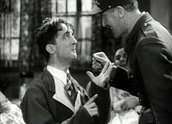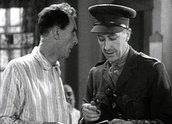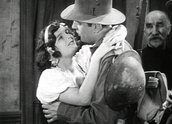


Diggers (1931)
Synopsis
At a battalion reunion after the First World War, Chic Williams (Pat Hanna) and his ‘cobber’ Joe Mulga (George Moon) recall their exploits on the Western Front in France. In extended flashbacks, we see them getting wounded, repatriated to London, trying to invent ways to avoid being sent back, then stealing rum and making fools of officers when they are inevitably sent back into the front lines. A stirring musical finale pays tribute to the men who didn’t come back.
Curator’s notes
Pat Hanna is now remembered largely, if at all, for his humorous recordings made in the 1930s, but his travelling comedy troupe, The Diggers, formed after the First World War, had considerable success on the Australasian theatre circuit in the 1920s. They were killed off by the talking picture, like a lot of these acts, so Pat Hanna joined with Melbourne impresario Frank Thring to bring his comedy to the big screen.
Diggers was his first movie, and it clearly shows its origins in the stage act. It’s based on three sketches from the shows, which are in turn based on Hanna’s own experiences as a New Zealand soldier in the Great War. Though his mother was Australian, he was born in New Zealand and educated there. He was a commercial artist and cartoonist in Wellington until August 1914, when he joined the New Zealand armed forces. He began in comedy as entertainment officer for the NZ (New Zealand) occupation forces in Germany, postwar.
Diggers shows his laconic style, in which rebellion is cloaked in a weary exterior, to good effect, but he shares a lot of screen time with his sidekick Joe, played by the diminutive George Moon. Frank Thring restructured Hanna’s script, so that the hospital scene comes first; he also turned the diggers marching out from the French town into the rousing finale, when this scene had originally opened the film. Hanna disagreed with the changes and directed himself in the next two films, Diggers in Blighty (1933) and Waltzing Matilda (1933). Both were moderately popular, but lost money – as did many of Hanna’s business dealings. Hanna then retired from film production.
- Overview
- Curator’s notes
- Video 3 clips

- Principal credits
- Find a copy
- Make a comment
- Add your review



